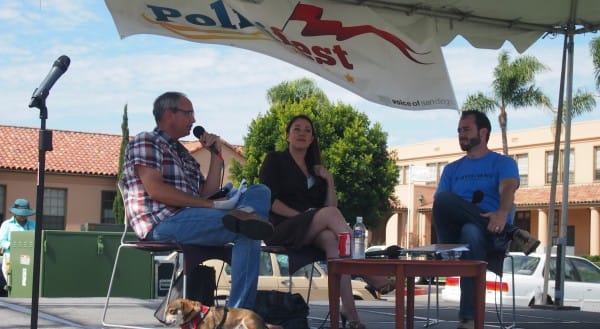Proposition Z Debate: Claims of Misinformation


The Voice of San Diego dedicated a time-slot to a Proposition Z discussion at Politifest 2012 on Sept. 29th. Proposition Z is a $2.8 billion bond measure for the San Diego Unified School District (SDUSD). Arguing against the measure was Lani Lutar, President of the San Diego County Taxpayers Association (SDCTA). Arguing in favor of the measure was Scott Barnett, SDUSD board member and former President of SDCTA.
In order to understand the Proposition Z debate, one must understand Proposition S. Proposition S was a $2.1 billion bond for SDUSD approved by voters in 2008. Of that money, $1.7 billion is still available.
After introductions, Ms. Lutar jumped into the discussion. Her arguments against Proposition Z are partly due to the Proposition S money that has not been spent. She also claims that Prop S is a high-interest bond that will eventually cost taxpayers at least five fold the original value:
At the end of the day, the schools own financial advisors have acknowledged that Proposition S is likely going to cost $10 to $14 billion because of the actions by the school board today.
Mr. Barnett replied saying, "That is if capital appreciation bonds were used for all future bonds," and Ms. Lutar came back with, "That's not correct."
Staying within the discussion of Proposition S, Ms. Lutar stated, "Based on the most recent report that was presented to the committee, zero has been spent on major repair and replacement projects." She continually expressed frustration with the district spending money on laptops and tablets. Mr. Barnett acknowledges money can be spent on technology, but deflected the claim on repairs:
Absolutely not true, you're uninformed. We've been very clear on what we spend money on. $253 million was spent on buildings, utilities, and infrastructure.
Now let's bring back the discussion of Proposition Z. Ms. Lutar opposes the measure because Proposition S has not been fully implemented. Mr. Barnett points to a $7 billion need list for the school district that cannot be covered by only previous bond measures. He stated, "each of these bonds builds upon the other and will continue to build the needs of the schools," in order to cover the district's need. Ms. Lutar showed discontent with a lack of a solid spending plan. She claimed:
Your own superintendent publicly stated that there is no financial plan built out looking into the future, his exact words. He said he can't tell how much Proposition Z is going to cost. There is nothing in the measure that guarantees that the bond will be spent wisely
Mr. Barnett then held up a document and stated, "This is the spending plan for Proposition Z, it's on the website, it's on the ballot." He also further articulated the spending plan:
It's going to average approximately $200 to $250 million a year at the lowest market interest rate available. This is because new revenues are being generated by this tax .
The attacks back and forth did not end there. Ms. Lutar was disgruntled with the technology spending of Proposition S and says that there are no safeguards to unsound spending. Mr. Barnett was frustration that the Taxpayers Association never showed willingness to work together on Proposition Z.
Proposition Z is intended to eliminate differed maintenance from 18 percent to 4 percent. The measure also lays out $210 million for investing in new technology solar energy and recycled greywater. The new technology is intended save energy costs.
Indeed there are many more aspects and factors to consider when dissecting Proposition Z. The discussion is complicated and the facts are dependent on unpredictable circumstances. What's harmful about the discussion is that both sides claim that neither is being completely honest. Both sides show dissatisfaction from lack of cooperation and misinformation.



